Ah, the age-old debate of which piece of gear is better. When it comes to making a fire, I have heard many arguments break out over lighters vs matches and which one is better. Each has its perks and pitfalls but when it comes to a survival situation, which one should you carry?
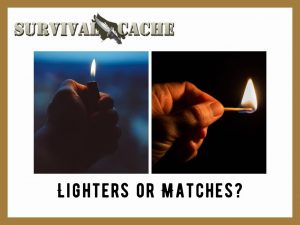
For this article I will be breaking down these two survival items, their pros, their cons and I will wrap it up with my opinion of which one is better. So strap in and let’s discuss lighters vs matches!
SKIP AHEAD
Lighters
For this section, I need to break down the four main types of survival lighters, I consider putting in a survival pack.
Bic Lighters
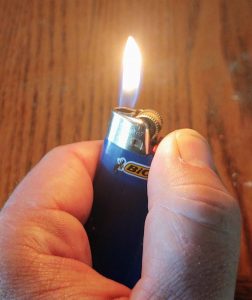
This is the gold standard of lighters due to their price, quality, and ease of use. It is a lighter with a self-contained fuel (butane) source. Rolling the striker wheel will produce a spark that lights the fuel almost every single time
Pros
- Lightweight
- Compact
- High quality
- Affordable
- Available at most stores
- Long-lasting (1,000 to 3,000 flint strikes)
- Refillable fuel
- If they become wet, dry them out and they will still work
Cons
- Should not be stored in hot areas or direct sunlight
- Under excessive pressure, the fuel section can burst.
Zippo Lighters
This is an iconic lighter and that I still use to this day. Flip the top (I love the clicking sound it makes) to expose a wick, striker wheel, flint, and a windproof casing. Pulling this top section out exposes the fuel area that is easily refillable and where the flint and wicks can be replaced.
Pros
- Windproof. I should clarify that these are not completely windproof. But once a flame is lit, the cage around the wick does a great job of keeping that flame going, even if a gust of wind comes through.
- Flints are easily replaced
- Fuel is easy to refill
- Ergonomic and easy to use
Cons
- If the lighter is not kept upright, fuel can seep out from the bottom. This does not only lose precious fuel but it can cause severe skin irritations.
- Extra fuel should be carried as the fuel in the lighter does not last that long.
- More expensive than a butane lighter.
Check out my hands-on review of the Zippo fire kit…
Electric Lighters
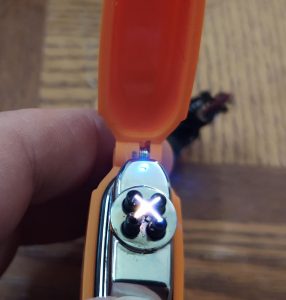
I am fairly new to using electric lighters, but I must say that so far I am a fan of them. They do not create a flame as traditional lighters do. Instead, they use electricity to create “arcs of plasma” that can instantly ignite many different types of materials. Instead of using traditional fuel, these lighters are recharged via a power source to “fill them up.”
Pros
- As easy to use as pushing a button
- Lightweight
- Compact
- Windproof
- Tesla Lighter by Survival Frog is rated for 300 ignitions per charge
- Will work indefinitely as long as there is a power source and the lighter components remain intact
- Some come with added tools such as a flashlight
Cons
- The most expensive option on this list
- Dependent on a power source
- Number of ignitions is far lower than regular lighters if you are dependent on a single charge
- More susceptible to moisture and water damage than regular lighters
My favorite electric lighter is the Tesla Survival lighter. Check out my detailed hands-on review or check out the product below:
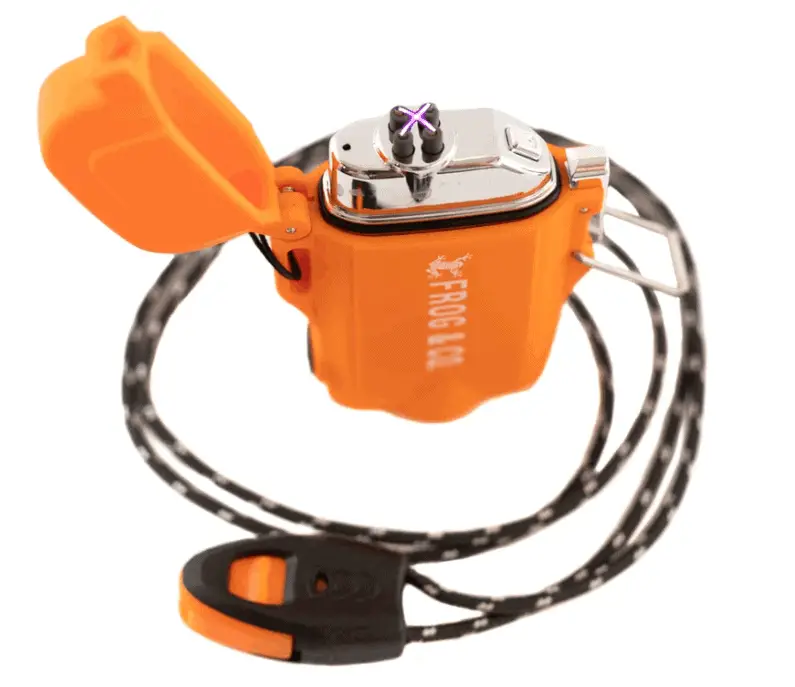 #1 Recommended
|
|
Check Latest Price |
Long Neck Lighters
Otherwise known as BBQ lighters. These are the long-necked lighters used most commonly to ignite outdoor grills, pilot lights, and candles.
Most people do not consider these in their survival kits but I do think they are a good option. They are affordable, easy to use and their design provides extra length for hard to reach places while keeping your finger away from the flame.
Pros
- Affordable
- Lightweight
- Easy to use
- Double button ignition safety feature
- The long neck provides extra reach
Cons
- Takes up more space than regular lighters.
- The spark by itself is not easily used.
- More fragile than a regular lighter
Matches
Just like the lighters, I will be breaking down this section into the four different types of survival matches I would consider packing into my kits.
Paper Matches
These are going to be the absolute cheapest type of matches that you can get. Some places even offer them for free with the purchase of certain products.
Pros
- Incredibly affordable
- Lightweight
- Compact
Cons
- Easily susceptible to moisture and water. Once they are wet they cannot be used.
- Because they are flimsy they can be difficult to ignite.
- Without a magnifying glass, they are dependent on a striker surface to function.
Kitchen Matches
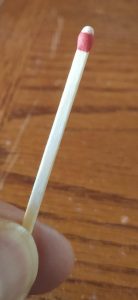
This style of matches is what most people think of for matches. A wood body frame that is slightly over two inches long, with a red, blue, or green striking head.
Pros
- Affordable
- Lightweight
- Compact
- Easy to use
Cons
- Easily susceptible to moisture and water, once they are wet they cannot be used.
- If not careful, the wood body can snap during striking.
- Without a magnifying glass, they are dependent on a striker surface to function.
Waterproof Matches
This option is almost identical to kitchen matches except they are coated with a waterproofing layer, typically some type of wax. The only real difference between these and kitchen matches is that they are not as susceptible to moisture and water.
Stormproof Matches
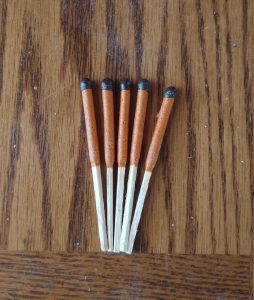
These are the big brother to kitchen matches and are the next generation of matches. They are windproof, waterproof, and once they are ignited they are almost impossible to extinguish. A lit match dropped into a puddle of water will still keep burning!
Pros
- Lightweight
- Easy to use
- Windproof
- Waterproof
- Will burn longer than a regular match
Cons
- More expensive
- Gives off a lot of fumes
- Without a magnifying glass, it is dependent on a striker surface
- Takes up more space than regular matches
The Verdict: Lighters vs Matches?
You may not like my initial answer because its that you should carry both a lighter and matches.
The ability to create fire easily and quickly, is so important why would you want to limit yourself to just one tool for that task? When you have the option, my recommendation would be to carry a Bic Lighter and stormproof matches.
But I will play the game that if I was backed into a corner of choosing only one type of lighter or one type of match then what would I choose? A Bic lighter wins every time. It is incredibly affordable, easy to use, durable, quality built, long-lasting fuel and flint, provides an instant flame, not dependent on a secondary striker surface, water-resistant, and can be purchased almost anywhere.

